
During the American Civil War, Ohio contributed many officers, politicians, and troops to the Union war effort; as well as a small number for the Confederacy.

During the American Civil War, Ohio contributed many officers, politicians, and troops to the Union war effort; as well as a small number for the Confederacy.
The following is a partial list of generals or rear admirals either born in Ohio or living in Ohio when they joined the Union Army or Union Navy (or in a few cases, men who were buried in Ohio following the war, although they did not directly serve in Ohio units). There also were 134 men given the brevet rank of brigadier general, and occasionally brevet major general, a few of whom are also included in this listing.

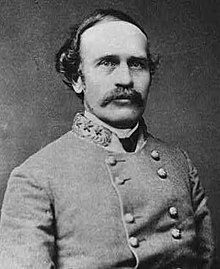
In addition, the following Ohioans served as generals in the Confederate States Army:

James Harrison Wilson was a topographic engineer in the United States Army and a Major General in the Union Army during the American Civil War. He initially served as an aide to Major General George B. McClellan during the Maryland Campaign before joining Major General Ulysses S. Grant's army in the Western Theater, where he was promoted to brigadier general. In 1864, he transferred from engineering to the cavalry, where he displayed notable leadership in many engagements of the Overland Campaign. However, his attempt to destroy Lee’s supply lines failed when he was routed by a much smaller force of Confederate irregulars.
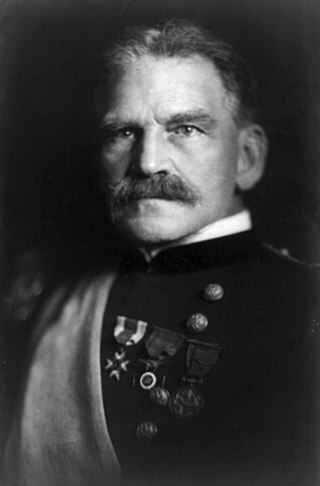
Adna Romanza Chaffee was a lieutenant general in the United States Army. Chaffee took part in the American Civil War and Indian Wars, played a key role in the Spanish–American War, and fought in the Boxer Rebellion in China. He was the Chief of Staff of the United States Army from 1904 to 1906, overseeing far-reaching transformation of organization and doctrine in the army.

Thomas Leonidas Crittenden was an American statesman, politician, soldier and lawyer from the U.S. state of Kentucky. He served as a general for the Union during the Civil War. His family was fairly typical for Kentucky, in that he and his father supported the Union during the war, but his elder brother fought for the Confederacy.

Joseph King Fenno Mansfield was a career United States Army officer and civil engineer. He served as a Union general in the American Civil War and was mortally wounded at the Battle of Antietam.

Samuel Emerson Opdycke was a businessman and Union Army brigadier general during the American Civil War.
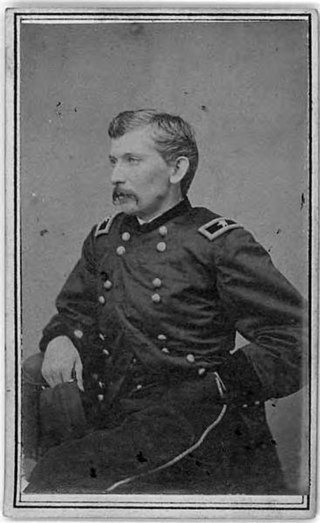
James William Forsyth was a U.S. Army officer and general. He was primarily a Union staff officer during the American Civil War and cavalry regimental commander during the American Indian Wars. Forsyth is best known for having commanded the 7th Cavalry at the Wounded Knee Massacre on December 29, 1890, during which more than 250 men, women, and children of the Lakota were killed and more than 50 were wounded.

The Battle of High Bridge refers to two engagements fought on April 6, 1865, and April 7, 1865, near the end of the Appomattox Campaign of the American Civil War about 4 miles (6.4 km) northeast of Farmville, Virginia. The first battle is often the one identified as the Battle of High Bridge.
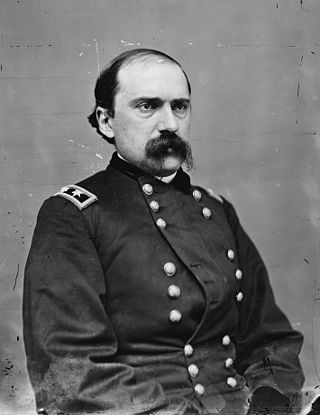
Edward Moody McCook was a lawyer, politician, distinguished Union cavalry general in the American Civil War, American diplomat, and governor of the territory of Colorado. He was a member of the famed "Fighting McCook" family of Ohio. Four of his brothers and 10 of his first cousins served as officers, with six of the family members becoming generals before the end of the war.
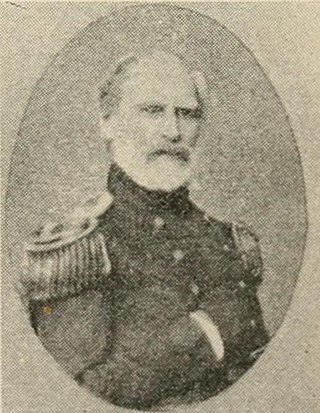
Joseph Pannell Taylor was a career United States Army officer and Union general in the American Civil War. He was the younger brother of Zachary Taylor, the 12th President of the United States.

Kenner Garrard was a brigadier general in the Union Army during the American Civil War. A member of one of Ohio's most prominent military families, he performed well at the Battle of Gettysburg, and then led a cavalry division in the army of Major General William T. Sherman during the Atlanta Campaign. He developed a reputation for personal bravery and was cited for gallantry at the Battle of Nashville as an infantry division commander.

Samuel Beatty was an American soldier, sheriff, and farmer from Ohio. He was a brigadier general in the Union Army during the American Civil War. In 1866, he was awarded the brevet grade of major general of volunteers.

William Linn McMillen was an American surgeon, army officer, farmer and carpetbagger legislator.

Charles Candy was a career soldier in the United States Army who served as an officer in the volunteer Union Army during the American Civil War. He commanded an Ohio regiment and, frequently, a brigade, during the war, and played a role in the defense of Culp's Hill during the July 1863 Battle of Gettysburg.

Henry Martyn Cist was an American soldier, lawyer, and author who was a Union Army captain and staff officer during the American Civil War. On December 11, 1866 he was nominated and on February 6, 1867 he was confirmed for appointment to the grade of brevet brigadier general of volunteers, to rank from March 13, 1865. He is most noted for his classic and oft-referenced 1882 book The Army of the Cumberland. In addition, Cist led pioneering efforts to preserve and interpret the sites of the battles of Chickamauga and Chattanooga.
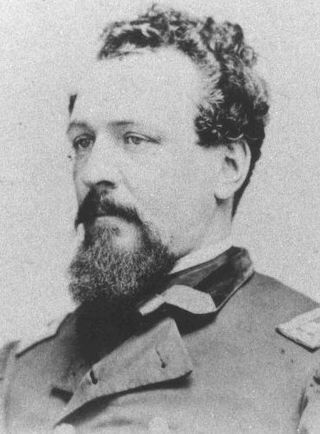
James Gwyn was an officer in the Union Army during the American Civil War. He immigrated at a young age from Ireland in 1846, initially working as a storekeeper in Philadelphia and later as a clerk in New York City. At the onset of the war, in 1861, he enlisted and was commissioned as a captain with the 23rd Pennsylvania Volunteer Infantry. He assumed command of the 118th Pennsylvania Regiment in the course of the war. Gwyn led that regiment through many of its 39 recorded battles, including engagements at Seven Pines, Fredericksburg, Shepherdstown, Five Forks, Gettysburg, and Appomattox Court House.